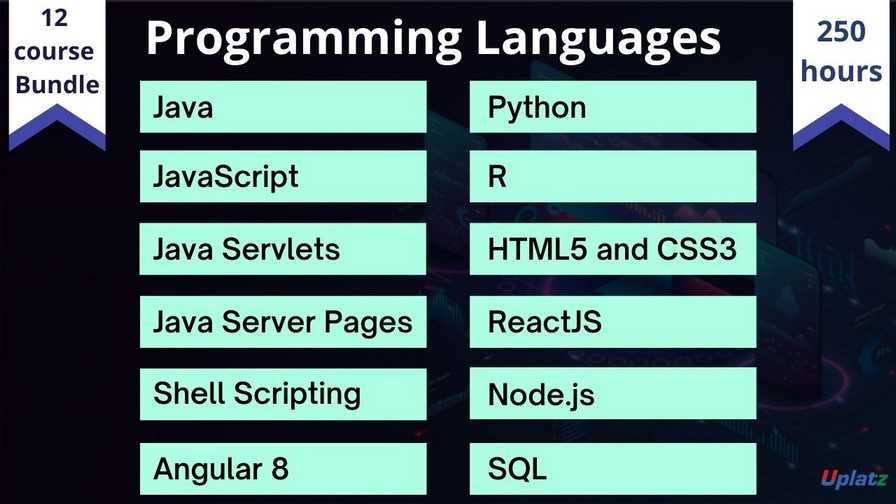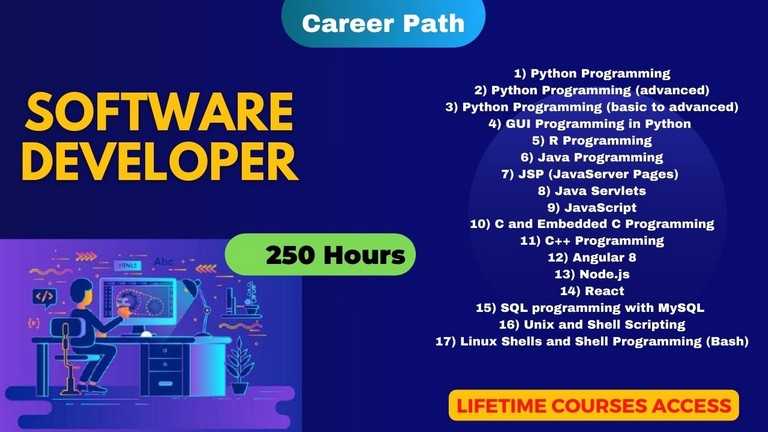C++ Programming
Learn C++, the most popular programming language. Objects, Lambda Expressions, Containers, Multithreads, Mutexes, Atomic Memory Models, Best PracticesPreview C++ Programming course
Price Match Guarantee Full Lifetime Access Access on any Device Technical Support Secure Checkout Course Completion Certificate 95% Started a new career
BUY THIS COURSE (
95% Started a new career
BUY THIS COURSE (GBP 12 GBP 29 )-
 100% Got a pay increase and promotion
100% Got a pay increase and promotion
Students also bought -
-

- C and Embedded C Programming
- 10 Hours
- GBP 12
- 157 Learners
-

- Bundle Course - Programming Languages
- 250 Hours
- GBP 22
- 2454 Learners
-

- Career Path - Software Developer
- 250 Hours
- GBP 32
- 3679 Learners

C++ is a versatile programming language that may be used for a variety of tasks. It's used to make operating systems, browsers, and games, among other things. C++ supports a variety of programming styles, including procedural, object-oriented, and functional programming. As a result, C++ is both strong and adaptable.This is a self-paced course that will teach you how to programme in C++. The building of command-line programmes that use various data kinds, expressions, decision branching, and iteration to solve issues is one of the subjects discussed. The lectures and laboratories teach students how to programme in C++. The information on C++ programming is provided in interactive lectures with weekly quizzes to check your comprehension.
Compiling their C++ programmes from human-readable source code to machine-readable object code will provide them hands-on experience with the development cycle. They'll then link their objects together to build an interactive executable.This Specialization is designed for novices, computer and other scientists, and artificial intelligence enthusiasts who want to improve their programming abilities in the basic languages of C and C++. You'll learn the fundamentals of programming in C before progressing to more sophisticated C++ semantics and syntax, which will equip you to apply these abilities to a variety of higher-level challenges including AI algorithms and Monte Carlo evaluation in complicated games.
Course/Topic - C++ Programming - all lectures
-
Lesson 1 - Introduction to C++ Programming
-
Lesson 2 - Debugging Tools - Objects - Types - Values
-
Lesson 3 - Operators - Expressions - Control Flow - Functions
-
Lesson 4 - Input - Output - Classes
-
Lesson 5 - Temporary Objects - Functors - Templates
-
Lesson 6 - Lambda Expressions - Classes - Inheritance
-
Lesson 7 - Virtual Functions and Run-time Polymorphism
-
Lesson 8 - Containers - Iterators - Algorithms - Templates
-
Lesson 9 - Time Measurements - Exceptions - References
-
Lesson 10 - Smart Pointers and References
-
Lesson 11 - Moving - Forwarding - Concurrency
-
Lesson 12 - Multithreads and Mutexes
-
Lesson 13 - Condition Variables and Atomics
-
Lesson 14 - Atomic Memory Models and Undefined Behavior
-
Lesson 15 - Best Practices - Tips - Pitfalls in C++
1).The goal of this course is to teach you the fundamental programming principles and approaches that are necessary for writing successful C/C++ applications.
2).To use laboratory experiences to learn essential programming approaches in the C/C++ programming language. The programming environment will be Microsoft Visual Studio.
3).Using the C/C++ programming language, develop, describe, test, and implement a well-structured, reliable computer software.
4).Creating reusable modules (collections of functions).
1) Introduction to C++ Programming
2) Debugging Tools - Objects - Types - Values
3) Operators - Expressions - Control Flow - Functions
4) Input - Output - Classes
5) Temporary Objects - Functors - Templates
6) Lambda Expressions - Classes - Inheritance
7) Virtual Functions and Run-time Polymorphism
8) Containers - Iterators - Algorithms - Templates
9) Time Measurements - Exceptions - References
10) Smart Pointers and References
11) Moving - Forwarding - Concurrency
12) Multithreads and Mutexes
13) Condition Variables and Atomics
14) Atomic Memory Models and Undefined Behavior
15) Best Practices - Tips - Pitfalls in C++
The C++ Programming Certification ensures you know planning, production and measurement techniques needed to stand out from the competition.
C++ is a powerful general-purpose programming language. It can be used to develop operating systems, browsers, games, and so on. C++ supports different ways of programming like procedural, object-oriented, functional, and so on. This makes C++ powerful as well as flexible.
C++ is often considered the hardest language, but it's not the only challenging one. Other programming languages that are categorized as unusually difficult are Prolog, LISP, Haskell, and Rust.
C++ Certified Associate Programmer (CPA) is a professional certificate that measures your ability to accomplish coding tasks related to the basics of programming in the C++ language and the fundamental notions and techniques used in object-oriented programming.
A valuable C/C++ certificate is a powerful weapon in the race for better employment, first-rate expertise and greater competitiveness. Certification opens doors to a better job and a better salary. It is a great motivator for self-improvement and self-development.
Uplatz online training guarantees the participants to successfully go through the C++ ProgrammingCertification provided by Uplatz. Uplatz provides appropriate teaching and expertise training to equip the participants for implementing the learnt concepts in an organization.
Course Completion Certificate will be awarded by Uplatz upon successful completion of the C++ Programming Online course.
The C++ Programming Draws an average salary of $124,000 per year depending on their knowledge and hands-on experience.
Computer programmers who write code in C++ computer language are expected to find an average number of opportunities at least through 2022, compared to other occupations, according to the U.S. Bureau of Labor Statistics. Job growth is expected to remain at 8 percent per year.
It will always be around for use, and it will always have a background in the world's most used softwares, but the limit of certainty may just end there. However, we can say for sure that C++ has a versatile future. It's a language built on the basis of other languages, and thus it may continue to evolve and spread.
Note that salaries are generally higher at large companies rather than small ones. Your salary will also differ based on the market you work in.
Q1.What is C++?
Ans-C++ is a computer programming language that is a superset of C, with additional features.
Q2.Does C++ make use of OOPS?
Ans-Yes, it does. An Object-Oriented Programming System is a paradigm that includes concepts such as data binding, polymorphism, and inheritance, among others.
Q3.What is a Class?
A class is a user-defined data type that is at the center of OOP. It reflects different entities, attributes, and actions.
Q4.Explain vTable and vptr.
Ans-vTable is a table containing function pointers. Every class has a vTable. vptr is a pointer to vTable. Each object has a vptr. In order to maintain and use vptr and vTable, the C++ compiler adds additional code at two places:
In every constructor – This code sets vptr:
Of the object being created
To point to vTable of the class
Code with the polymorphic functional call – At every location where a polymorphic call is made, the compiler inserts code in order to first look for vptr using the base class pointer or reference. The vTable of a derived class can be accessed once the vptr is successfully fetched. The address of the derived class function show() is ccessed and called using the vTable.
Q5.How is function overloading different from operator overloading?
Ans-Function overloading allows two or more functions with different types and number of parameters to have the same name. On the other hand, operator overloading allows for redefining the way an operator works for user-defined types.
Q6.Is it possible for a C++ program to be compiled without the main() function?
Ans-Yes, it is possible. However, as the main() function is essential for the execution of the program, the program will stop after compiling and will not execute.
Q7.What is a mutable storage class specifier?
Ans-A mutable storage class specifier applies only to a class’s non-static and non-constant member variables for altering the constant class object’s member by declaring it.
Q8.What is Encapsulation?
Ans-Encapsulation refers to wrapping or binding data members and their functions within a class. This process is done for security reasons as it restricts access from any outside method. If the data member is private, only its member function can access the data.
Q9.In C++, where is an automatic variable stored?
Ans-All local variables are auto variables by default and are stored in the stack memory.
Q10.What are the different data types present in C++?
Ans-There are 4 Data types present in C++, they are:
a) Primitive Datatype(basic datatype). Example- char, short, int, float, long, double, bool, etc.
b) Derived datatype. Example- array, pointer, etc.
c) Enumeration. Example- enum
d) User-defined data types. Example- structure, class, etc
Q11. What are access modifiers?
Ans-C++ has three access modifiers: public, private, and protected. Data hiding is one of the most important characteristics of object-oriented programming languages like C++. Data hiding refers to limiting access to a class's data members.
Q12. Can we call a virtual function from a constructor?
Ans-We can use a constructor to call a virtual function. However, in this scenario, the behavior differs slightly. The virtual call is resolved at runtime when a virtual function is invoked. The current class's member function is always invoked. That is, the constructor does not support virtual machines
Q13.Can we call a virtual function from a constructor?
Ans-We can use a constructor to call a virtual function. However, in this scenario, the behavior differs slightly. The virtual call is resolved at runtime when a virtual function is invoked. The current class's member function is always invoked. That is, the constructor does not support virtual machines
Q14.Does C++ have a string primitive data type?
Ans-C++ cannot have a string primitive data type, but rather it has a class from the Standard Template Library (STL).
Q15.What is the function of the scope resolution operator?
Ans-The scope resolution operator serves two purposes:
a) It helps resolve the scope of global variables
b)When a function is defined outside a class, the scope resolution operator associates that function with the class









